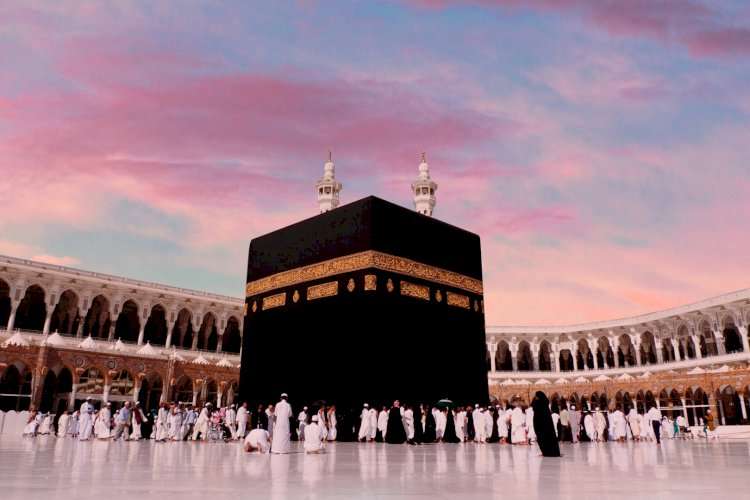
The Kaaba is the most sacred place in Islam. Muslims all over the world face towards it when they pray, and it is the center of the annual pilgrimage (Hajj). But many people wonder: who built the Kaaba? Was it built in the time of Prophet Muhammad ﷺ, or did it exist long before?
To answer this, we need to go back in history, all the way to the time of the prophets.
The First Construction of the Kaaba
The Kaaba is not a new structure; it has been standing for thousands of years. According to Islamic tradition, the first person to build the Kaaba was Prophet Adam (AS), the very first human and prophet. It is said that after being sent down to earth, Allah guided Adam (AS) to build a place of worship, and this became the original foundation of the Kaaba.
Later, over time, the Kaaba was lost or damaged, but its foundation remained.
Ibrahim (Abraham) and Isma‘il (Ishmael) (AS)
The most well-known story of the Kaaba’s construction is linked to Prophet Ibrahim (AS) and his son Isma‘il (AS). Allah commanded them to rebuild the Kaaba on its original foundation.
The Qur’an tells us:
“And [mention] when Abraham was raising the foundations of the House and [with him] Ishmael, [saying], ‘Our Lord, accept [this] from us. Indeed, You are the Hearing, the Knowing.’”
(Surah Al-Baqarah 2:127)
Together, they built the Kaaba as a house of worship dedicated only to Allah. This is why Ibrahim (AS) is sometimes called the father of monotheism, because he restored true worship in Makkah.
It was during this construction that the famous Black Stone (Hajr al-Aswad) was placed in the corner of the Kaaba. Muslims today still see this stone as a significant symbol of the Kaaba’s history.
The Quraysh and the Kaaba Before Islam
Many centuries later, the Kaaba was rebuilt again by the tribe of Quraysh, who were the caretakers of the Kaaba during the time of the Prophet Muhammad ﷺ.
At that time, the Kaaba had been damaged by floods. The Quraysh decided to rebuild it, but they faced a problem when it came to placing the Black Stone back in its place. Different clans argued about who should have the honor.
To solve the dispute, they asked the Prophet Muhammad ﷺ—who was not yet a prophet but was already known as Al-Amin (the trustworthy)—to decide. He placed the stone on a cloth and asked the leaders of each clan to hold the edges together, lifting it in unity. Then, he placed the stone with his own blessed hands. This act of wisdom earned him even more respect.
The Kaaba Today
Since then, the Kaaba has been maintained, rebuilt, and expanded several times by Muslim rulers. Today, it stands in the Masjid al-Haram in Makkah, covered with a black cloth known as the Kiswah, which is changed every year.
It remains the holiest site for Muslims, the qiblah (direction of prayer), and the place where millions gather for Hajj and Umrah.
Why the Kaaba Matters
The Kaaba is not worshipped itself; rather, it is a symbol of unity for Muslims. No matter where a Muslim lives—in Asia, Africa, Europe, or America—they all turn towards the Kaaba when praying. This shows that Islam unites people of all races and backgrounds under the worship of one God, Allah.
The Kaaba also connects us to the legacy of the prophets, especially Ibrahim (AS), Isma‘il (AS), and Muhammad ﷺ.
Conclusion
The Kaaba was first built by Prophet Adam (AS) and later rebuilt by Prophet Ibrahim (AS) and his son Isma‘il (AS). It was again reconstructed by the Quraysh during the time of Prophet Muhammad ﷺ, and since then, it has been cared for and expanded by Muslims throughout history.
Today, it stands as a shining symbol of unity, faith, and the oneness of Allah. When Muslims face the Kaaba, they remember that their worship is directed only to Allah, the Lord of the worlds.
Insha’Allah, may Allah allow every Muslim to visit the Kaaba and perform Hajj or Umrah at least once in their lifetime.
Learn More About Islamic History
If you would like to explore more about the Kaaba, the lives of the prophets, and other important parts of Islamic history, visit Online Islamic Institute. They offer premium Islamic courses for all ages—perfect for anyone who wants to deepen their understanding of Islam step by step.
Check their courses here: https://onlineislamicinstitute.org/ – insha’Allah, it will be a journey full of knowledge and blessings.
JazakAllahu khair for reading. May Allah increase us in knowledge and love for His sacred House. Wa Assalamu Alaikum wa Rahmatullahi wa Barakatuh.